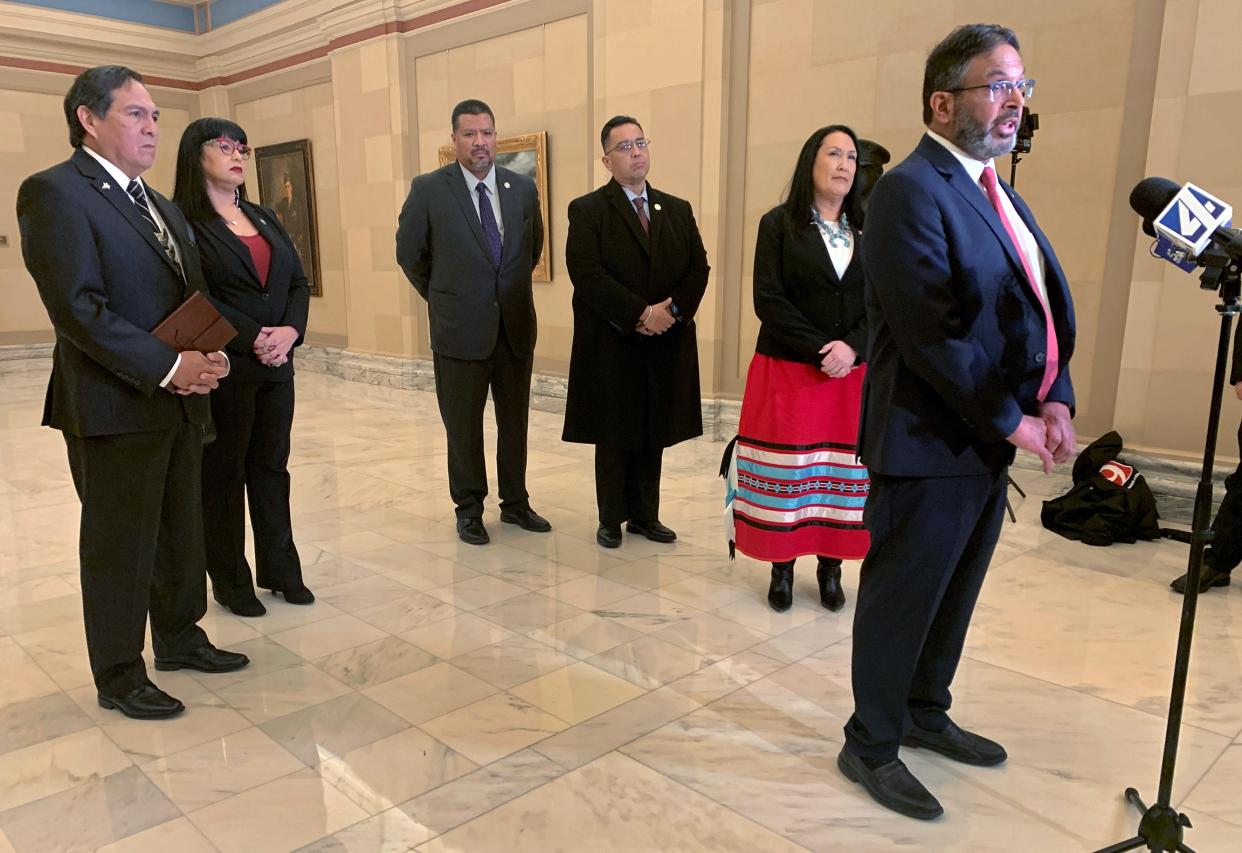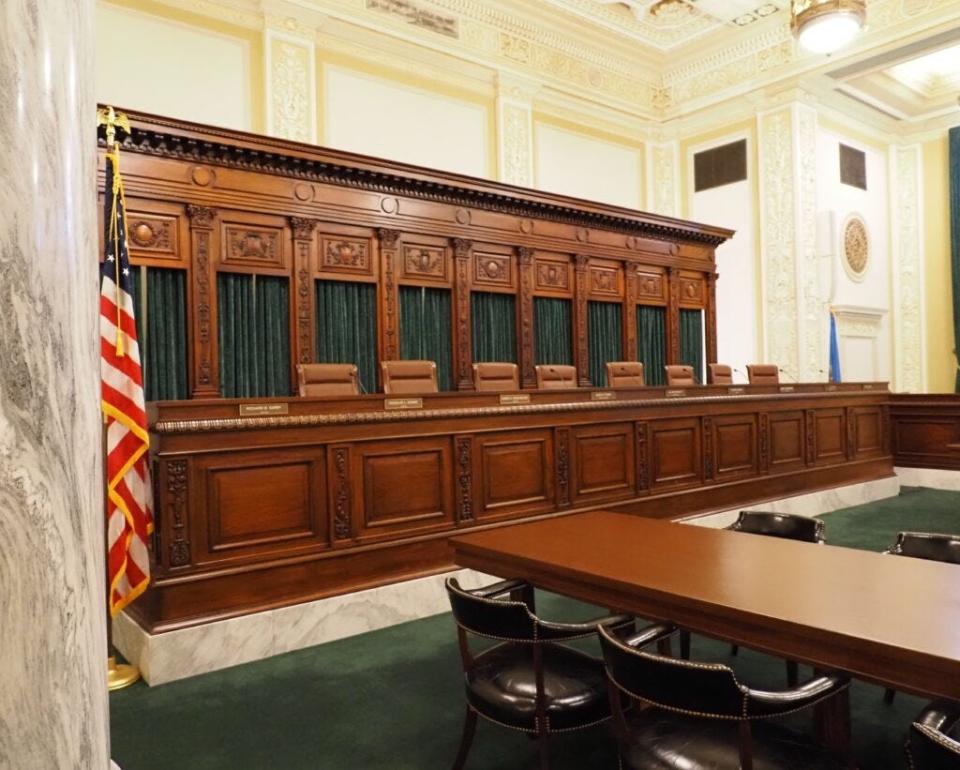Can state tax tribal citizens on reservations? Oklahoma Supreme Court considers case

- Oops!Something went wrong.Please try again later.
When Alicia Stroble filed her taxes every year, she always stopped at the questions that asked if she lived on tribal lands and worked for her tribe.
Yes and yes, she always thought. She belonged to the Muscogee (Creek) Nation, worked for her tribe and lived within the reservation Creek people had been promised. After the U.S. Supreme Court backed her up — ruling in 2020 that the Muscogee reservation still existed — she asked the state to refund her recent income tax payments. She believed Oklahoma had no right to tax tribal citizens on tribal land under federal law.
More: Vetoes, lawsuits and fake memes: Oklahoma Gov. Kevin Stitt’s year working with tribes
But the Oklahoma Tax Commission disagreed.
Her appeal landed before the Oklahoma Supreme Court on Wednesday. The ruling could determine whether the state can not only tax Stroble, but thousands of other tribal citizens who live and work within their tribal reservations recognized after McGirt v. Oklahoma.
Justices grilled attorneys on both sides of the dispute during the hearing, which lasted nearly two hours at the Capitol. They asked several times about the potential monumental weight of their decision.
“If we rule for Ms. Stroble today, would that decision not apply to all of eastern Oklahoma, including my home county, Johnston County?” asked Vice Chief Justice Dustin Rowe, a former Tishomingo city attorney and Chickasaw Nation judge appointed to the court in 2019 by Gov. Kevin Stitt.
Attorneys for the state and the Muscogee Nation agreed the tax dispute extends far beyond Stroble, but they disagreed on how consequential it could be for the state’s bottom line.

The Oklahoma Tax Commission has estimated tax collections will drop by about $75 million a year if the state can no longer tax tribal citizens who live and work on the reservations of the Five Tribes, which includes the Muscogee Nation.
“That is money the state needs, because the state is providing services across eastern Oklahoma,” said Kannan Shanmugam, a Washington, D.C.-based attorney hired by the state to argue its case.
But Riyaz Kanji, an attorney for the Muscogee Nation, pointed out tribes also provide services. He noted how Stitt had called earlier this week for a statewide tax cut that would cost the state’s coffers far more than $75 million.
“The arguments being made here are legislative, not judicial,” said Kanji, whose practice is based in Michigan.
More: Grading Oklahoma: A look at Native American tribes in Oklahoma, the challenges they face
About 50 people sat in on the hearing, including the governor’s attorney and Native American liaison.
Kanji argued that the law is clear that the state has no right to tax tribal citizens on tribal lands.
Shanmugam countered that tribal lands covered by the exemption do not include privately held properties such as Stroble’s.
He also contended the state’s right to tax tribal citizens was supported by two key Supreme Court rulings, including a 2022 ruling that directly involved the state. Justices ruled in that case, Oklahoma v. Castro-Huerta, that the state could still prosecute non-tribal citizens accused of harming tribal citizens on reservations.
Shanmugam said the ruling required the state Supreme Court to balance the interests of Oklahoma versus those of the tribe, and he argued the state won out.
“We think the tribal interest is quite slight,” he said.
Kanji pushed back against that claim and said the Castro-Huerta decision had not overruled longstanding precedent.
Some justices also seemed skeptical of Shanmugam’s assertion that the tribe should have acted earlier if it had a strong interest in issues tied to taxes.
Justice Yvonne Kauger, who has sat on the court for four decades, noted the federal government worked to disempower tribes for decades, and it wasn’t until the 1970s that the United States changed course.
More: Flag display outside Oklahoma Capitol honors tribal nations — but leaves some out
“Initially the tribes didn’t have the money or the opportunity to build briefcase warriors, which they now do, and this is really, maybe the second generation where they’ve had that opportunity,” Kauger said. “So there’s probably a pretty good reason that they didn’t launch an appeal.”
The Oklahoma Supreme Court may not have the final say on the dispute, because the ruling could be appealed to the United States Supreme Court. At least two justices, both Stitt appointees, questioned the lasting power of their decision.
“I would not underestimate the significance of how this court rules,” Kanji said.
More: Tensions rise as Muscogee Nation accuses county jailer of assaulting officer
Stroble watched the hearing with a handful of lawyers and Muscogee Nation Principal Chief David Hill at the front of the room. She left feeling thankful and blessed to be a Muscogee (Creek) citizen, she said.
She’s pushed her case forward for years not only for herself, but for all the other tribal citizens the ruling could affect.
“I believe that their reservations have never disestablished,” she said. “It’s law, and it’s right.”
Molly Young covers Indigenous affairs. Reach her at mollyyoung@gannett.com or 405-347-3534.
This article originally appeared on Oklahoman: Behind the Oklahoma tax case that could impact thousands of tribal citizens

